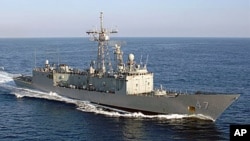As attacks in the Indian Ocean continue, a new study estimates Somali Piracy to cost the international community billions of dollars every year.
With piracy on the rise worldwide, a United States think tank is attempting to measure the toll it is taking on the international economy. Colorado-based think tank One Earth Future has released a report which estimates the cost of piracy in 2010 to be between $7 and $12 billion worldwide.
While available data from areas such as West Africa and the Malacca Strait in southeast Asia have been included in the groups accounting, the bulk of the cost of international piracy stems from hijacking committed by Somali pirates.
The Associated Press has reported that at least 28 ships and 660 crewmembers are currently being held in Somalia. 2010 saw a spike in ransom prices, with some ships, including the South Korean Samho Dream being released for a reported $9.5 million ransom.
But according to report author Anna Bowden, ransoms are only one of the many costs created by Somalia’s pirates.
"A number of ships will not go through piracy zones right now," said Bowden. "They’ll actually reroute around the coast of Africa, via the Cape of Good Hope. Costs there are about $2.4 to $3 billion per year. Other costs are security equipment, insurance premiums and so on. There are also costs to government that we need to remember. There are costs of naval forces. There are also costs of prosecution, as well as anti-piracy organizations."
A cost of $12 billion per year may seem low, but Bowden emphasized the figure was a conservative estimate which could potentially increase. The analyst told VOA the number was likely deflated by the worldwide economic crisis; Bowden expects that figure to increase as international shipping rebounds.
Bowden’s report is more than just a calculation. The study is part of One Earth Future’s Oceans Beyond Piracy Project. The system used to estimate the cost of piracy was developed as an open-source model which will allow the international community to contribute data and more accurately estimate the crime’s global impact.
Meanwhile it has been reported that six crewmembers of the Danish vessel M/V Leopard have been kidnapped while transporting weapons in the Gulf of Aden Thursday. The Leopard was found floating empty by NATO forces and it is believed the crew is being held aboard a Taiwanese ship also captured by Somali hijackers.
Study: Piracy Costs World Up to $12 Billion Annually




